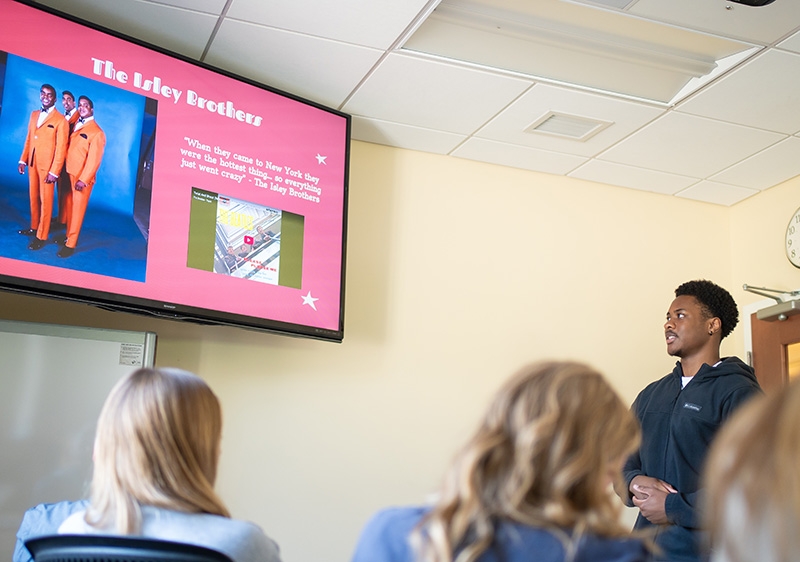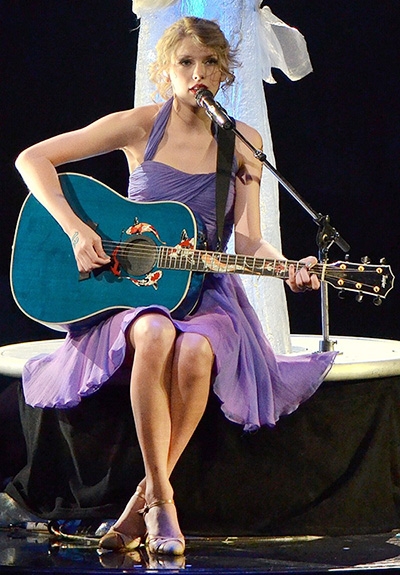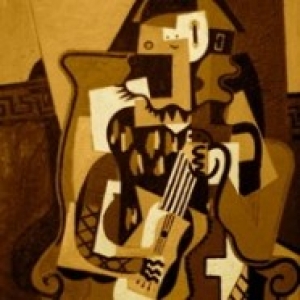Inside a small seminar room in Karp Hall, a video clip of Chuck Berry’s iconic 1956 anthem to rock and roll music, “Roll Over Beethoven,” plays on a monitor at the front of the space.
I’m gonna write a little letter
Gonna mail it to my local DJ
It’s a rockin’ rhythm record
I want my jockey to play
Roll over Beethoven. I gotta hear it again today
Moments later, a clip of the Beatles 1964 cover of the song appears on screen.
What follows is a spirited discussion on the cultural impact of the song, which was written by Berry and celebrates the thunderous arrival of rock and roll over the old established order of classical music.
“What a great song,” says Hugh Jenkins, professor of English. “Roll over, Beethoven. There’s a new man in town. He’s got a guitar, and he’s not from your culture. Can you imagine in the 1950s a Black guy (Berry) getting up and singing ‘Roll Over Beethoven?’”
Maren Krasner ’28, a music major from Newburgh, N.Y., and a Beatles fan, prefers Berry’s version.
“It’s got more grit to it,” says Krasner. “The Beatles were saying the words. With Berry, he was singing. Get out of here Beethoven, I’m here.”
Jack Madden ’26 was blunter.
“I love that it’s roll over Beethoven, not move over Beethoven,” says Madden, an American studies major from Lewiston, Maine. “It gives the image of a pushing out a dead body, that it should have been gone a while ago.”
Lively discussions like these are part of a course this spring term taught by Jenkins, “The Beatles, Motown and Taylor Swift.”
As the syllabus states, it is a “course on the cultural politics of popular music. Since pop music is, by definition, ephemeral, shaped by and to some degree shaping the attitudes of a particular time and place, it can offer us deep insights into what those attitudes were.”
Jenkins, who joined Union in 1992, first taught the course nearly 20 years ago. Initially, the focus was solely on the Beatles. Soon, he added Motown to demonstrate how a genre dominated by Black artists influenced the Beatles and vice versa. Recent iterations of the course have included a third artist, such as Bob Dylan and Prince. This time around, it was only natural to include Swift, the biggest pop star in the world for today’s students.
“Regardless of what you think about her music, she is a cultural force,” says Jenkins.
Artists such as the Beatles, Bruce Springsteen and The Grateful Dead have long been on academia’s radar for their music, historical context, cultural impact and economic legacy.
Some may mistakenly dismiss a class on popular artists as one big dance party. Jenkins emphasized that his class is not a music course.
“The course is about the politics of taste,” he said. “Why do people like what they like, and why do some things survive? This brings in sociology, political science, economics, marketing and psychology.”
In one recent class, students compared the marketing budgets of the Beatles, which was about $45,000, or $500,000 in today’s dollars, to Swift’s. The pop sensation reportedly has a marketing budget of $1 billion.
“So, this is tied in to our economic culture,” Jenkins said.
Jenkins leads the 15 students in the class on a 10-week deep dive into the three artists. They listen to countless hours of music and watch movies and documentaries such as “A Hard Day’s Night” “Hitsville USA” and “Taylor Swift: The Eras Tour.” They are also assigned readings from acclaimed journalists and essayists, including Rob Sheffield and Gerard Early.
Each student is also required to make a presentation. On this particular day, Madden gave an overview of the connection between the Beatles and the Civil Rights Movement.
Krasner said she has always been interested in how music connects with culture and how it can influence people’s thinking and attitudes.
“This class has made me appreciate the cultural relevance and impact of music in ways I hadn’t fully considered before,” she said. “I’ve found myself thinking more critically about the music I listen to every day, and how it both reflects and influences broader social and political movements.”
Maren Kreutzer ’27 is a huge Beatles fan. She took the class, in part, in hopes of learning something new about her favorite band.
“This has already happened tenfold,” said Kreutzer, a double major in English and environmental science from North Salem, N.Y. “I have learned so much about their influences with Black artists like Little Richard and Chuck Berry being the most obvious, and the impact they have had on the entire world, not just in pop music. It has been simply wonderful to dig deeper into the history of my favorite band and fully understand why they had--and continue to have--such an impact.”
While most students were familiar with the Beatles and Taylor Swift, many say they were not sure about Motown and its impact on culture. The class has helped changed that.
“I know Stevie Wonder. I know the Temptations,” said Maggie Weinstein ’26, a double major in psychology and English from Brooklyn. “I didn’t realize they were all under this umbrella of Motown. When we started listening, it was like, oh yeah, everyone knows these songs.”
The first weeks of the class focused on the Beatles before shifting to Motown. The last two weeks of the course will concentrate on Swift. Jenkins admits he knows little about the global superstar, so he will take a step back and, as the syllabus describes, let the “Swifties take over.”
He will be, as the title of one of Swift’s hits suggests, ready for it.
“They will be teaching me,” says Jenkins. “They will be in charge.”


